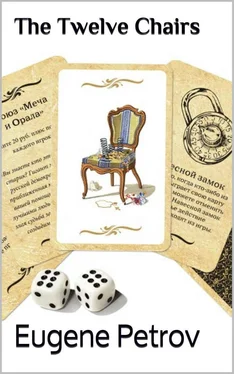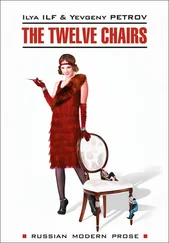Eugene Petrov - The Twelve Chairs
Здесь есть возможность читать онлайн «Eugene Petrov - The Twelve Chairs» весь текст электронной книги совершенно бесплатно (целиком полную версию без сокращений). В некоторых случаях можно слушать аудио, скачать через торрент в формате fb2 и присутствует краткое содержание. Год выпуска: 2013, Жанр: Юмористическая проза, на английском языке. Описание произведения, (предисловие) а так же отзывы посетителей доступны на портале библиотеки ЛибКат.
- Название:The Twelve Chairs
- Автор:
- Жанр:
- Год:2013
- ISBN:нет данных
- Рейтинг книги:5 / 5. Голосов: 1
-
Избранное:Добавить в избранное
- Отзывы:
-
Ваша оценка:
- 100
- 1
- 2
- 3
- 4
- 5
The Twelve Chairs: краткое содержание, описание и аннотация
Предлагаем к чтению аннотацию, описание, краткое содержание или предисловие (зависит от того, что написал сам автор книги «The Twelve Chairs»). Если вы не нашли необходимую информацию о книге — напишите в комментариях, мы постараемся отыскать её.
Find traces of a separate headset difficult and heroes face different adventures and troubles.
The Twelve Chairs — читать онлайн бесплатно полную книгу (весь текст) целиком
Ниже представлен текст книги, разбитый по страницам. Система сохранения места последней прочитанной страницы, позволяет с удобством читать онлайн бесплатно книгу «The Twelve Chairs», без необходимости каждый раз заново искать на чём Вы остановились. Поставьте закладку, и сможете в любой момент перейти на страницу, на которой закончили чтение.
Интервал:
Закладка:
up and down the deck with his hands in his pockets, ignoring Vorobyaninov on
the quayside.
At first Ippolit Matveyevich made signs; then he was even daring enough
to whistle. But Bender paid no heed. Turning his back on the president of
the concession, he watched with interest as the hydraulic press was lowered
into the hold.
Final preparations for casting off were being made. Agafya Tikhonovna,
alias Mura, ran with clattering feet from her cabin to the stern, looked at
the water, loudly shared her delight with the balalaika virtuoso, and
generally caused confusion among the honoured officials of the lottery
enterprise.
The ship gave a second hoot. At the terrifying sound the clouds moved
aside. The sun turned crimson and sank below the horizon. Lamps and street
lights came on in the town above. From the market in Pochayevsky Ravine
there came the hoarse voices of gramophones competing for the last
customers. Dismayed and lonely, Ippolit Matveyevich kept shouting something,
but no one heard him. The clanking of winches drowned all other sounds.
Ostap Bender liked effects. It was only just before the third hoot,
when Ippolit Matveyevich no longer doubted that he had been abandoned to the
mercy of fate, that Ostap noticed him.
"What are you standing there like a coy suitor for? I thought you were
aboard long ago. They're just going to raise the gangplank. Hurry up! Let
this citizen board. Here's his pass."
Ippolit Matveyevich hurried aboard almost in tears.
"Is this your boy?" asked the boss suspiciously.
"That's the one," said Ostap. "If anyone says he's a girl, I'm a
Dutchman!"
The fat man glumly went away.
"Well, Pussy," declared Ostap, "we'll have to get down to work in the
morning. I hope you can mix paints. And, incidentally, I'm an artist, a
graduate of the Higher Art and Technical Workshops, and you're my assistant.
If you don't like the idea, go back ashore at once."
Black-green foam surged up from under the stern. The ship shuddered;
cymbals clashed together, flutes, cornets, trombones and tubas thundered out
a wonderful march, and the town, swinging around and trying to balance,
shifted to the left bank. Continuing to throb, the ship moved into midstream
and was soon swallowed up in the darkness. A minute later it was so far away
that the lights of the town looked like sparks from a rocket that had frozen
in space.
The murmuring of typewriters could still be heard, but nature and the
Volga were gaining the upper hand. A cosiness enveloped all those aboard the
S.S. Scriabin. The members of the lottery committee drowsily sipped their
tea. The first meeting of the union committee, held in the prow, was marked
by tenderness. The warm wind breathed so heavily, the water lapped against
the sides of the ship so gently, and the dark outline of the shore sped past
the ship so rapidly that when the chairman of the union committee, a very
positive man, opened his mouth to speak about working conditions in the
unusual situation, he unexpectedly for himself, and for everyone else, began
singing:
"A ship sailed down the Volga,
Mother Volga, River Volga. . ."
And the other, stern-faced members taking part in the meeting rumbled
the chorus:
"The lilac bloo-ooms. . ."
The resolution on the chairman's report was just not recorded. A piano
began to play. Kh. Ivanov, head of the musical accompaniment, drew the most
lyrical notes from the instrument. The balalaika virtuoso trailed after
Murochka and, not finding any words of his own to express his love, murmured
the words of a love song.
"Don't go away! Your kisses still fire me, your passionate embraces
never tire me. The clouds have not awakened in the mountain passes, the
distant sky has not yet faded as a pearly star."
Grasping the rail, Simbievich-Sindievich contemplated the infinite
heavens. Compared with them, his scenic effects appeared a piece of
disgusting vulgarity. He looked with revulsion at his hands, which had taken
such an eager part in arranging the scenic effects for the classical comedy.
At the moment the languor was greatest, Galkin, Palkin, Malkin, Chalkin
and Zalkind, who were in the stern of the ship, began banging away at their
surgical and brewery appliances. They were rehearsing. Instantly the mirage
was dispelled. Agafya Tikhonovna yawned and, ignoring the balalaika
virtuoso, went to bed. The minds of the trade unionists were again full of
working conditions, and they dealt with the resolution. After careful
consideration, Simbievich-Sindievich came to the conclusion that the
production of The Marriage was not really so bad. An irate voice from the
darkness called Georgetta Tiraspolskikh to a producer's conference. Dogs
began barking in the villages and it became chilly.
Ostap lay in a first-class cabin on a leather divan, thoughtfully
staring at a green canvas work belt and questioning Ippolit Matveyevich.
"Can you draw? That's a pity. Unfortunately, I can't, either."
He thought for a while and then continued.
"What about lettering? Can't do that either? Too bad. We're supposed to
be artists. Well, we'll manage for a day or so before they kick us out. In
the time we're here we can do everything we need to. The situation has
become a bit more complicated. I've found out that the chairs are in the
producer's cabin. But that's not so bad in the long run. The important thing
is that we're aboard. All the chairs must be examined before they throw us
off. It's too late for today. The producer's already asleep in his cabin."
CHAPTER THIRTY-TWO
A SHADY COUPLE
People were still asleep, but the river was as alive as in the daytime.
Rafts floated up and down-huge fields of logs with little wooden houses on
them. A small, vicious tug with the name Storm Conqueror written in a curve
over the paddle cover towed along three oil barges in a line. The Red
Latvia, a fast mail boat, came up the river. The Scriabin overtook a convoy
of dredgers and, having measured her depth with a striped pole, began making
a circle, turning against the stream.
Aboard ship people began to wake up. A weighted cord was sent flying on
to the Bramino quayside. With this line the shoremen hauled over the thick
end of the mooring rope. The screws began turning the opposite way and half
the river was covered with seething foam. The Scriabin shook from the
cutting strokes of the screw and sidled up to the pier. It was too early for
the lottery, which did not start until ten.
Work began aboard the Scriabin just as it would have done on land-at
nine sharp. No one changed his habits. Those who were late for work on land
were late here, too, although they slept on the very premises. The field
staff of the Ministry of Finance adjusted themselves to the new routine very
quickly. Office-boys swept out their cabins with the same lack of interest
as they swept out the offices in Moscow. The cleaners took around tea, and
hurried with notes from the registry to the personnel department, not a bit
surprised that the latter was in the stern and the registry in the prow. In
the mutual settlement cabin the abacuses clicked like castanets and the
adding machine made a grinding sound. In front of the wheelhouse someone was
being hauled over the coals.
Scorching his bare feet on the hot deck, the smooth operator walked
round and round a long strip of bunting, painting some words on it, which he
Читать дальшеИнтервал:
Закладка:
Похожие книги на «The Twelve Chairs»
Представляем Вашему вниманию похожие книги на «The Twelve Chairs» списком для выбора. Мы отобрали схожую по названию и смыслу литературу в надежде предоставить читателям больше вариантов отыскать новые, интересные, ещё непрочитанные произведения.
Обсуждение, отзывы о книге «The Twelve Chairs» и просто собственные мнения читателей. Оставьте ваши комментарии, напишите, что Вы думаете о произведении, его смысле или главных героях. Укажите что конкретно понравилось, а что нет, и почему Вы так считаете.












